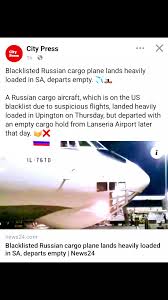Introduction
The issue of blacklisted Russian cargo planes has gained significant attention in light of the ongoing geopolitical tensions arising from Russia’s actions in Ukraine. Following international sanctions, a number of Russian aircraft have been barred from operating in multiple airspaces, complicating global trade and logistics. This development is especially critical for nations evaluating their trade routes and partnerships, impacting various sectors relying on air transport.
Details and Current Events
As of early 2024, over 500 Russian cargo planes have fallen under flight bans imposed by the European Union, the United States, and other allied countries. These restrictions have led to increased scrutiny of air cargo operations linked to Russia, particularly for those engaged in sectors such as technology, military goods, and essential commodities.
The bans have prompted Russian airlines to seek alternative routes and partnerships, most notably with countries that still maintain diplomatic ties with Russia. This shift has led to a rise in operations through nations such as Turkey, Iran, and China, effectively creating a circumvention strategy that allows some Russian airlines to maintain operational capabilities, albeit with significant logistical hurdles.
Broader Implications
The blacklisting of Russian cargo planes may lead to long-term implications for global aviation and supply chains. Many countries are now reevaluating their air transport regulations and practices related to cargo logistics. The increased complexity in air cargo logistics may also impose additional costs and delays, impacting businesses reliant on timely shipments.
Furthermore, the situation has heightened concerns around air safety and the tracking of cargo, as the international community remains watchful of potential breaches of sanctions. Industries like agriculture, pharmaceuticals, and consumer goods may experience ripple effects as access to Russian markets grows more tenuous.
Conclusion
In conclusion, the blacklisting of Russian cargo planes is a significant issue that reflects broader geopolitical conflicts affecting international trade. Understanding the ramifications of these flight bans is essential for businesses and policymakers alike. As global dynamics continue to evolve, timely information and adaptive strategies will be crucial for navigating the challenges presented by restrictions on cargo transport. With no resolution in sight, monitoring this situation is vital as it will likely shape the future of international air cargo operations and trade relationships across the globe.


